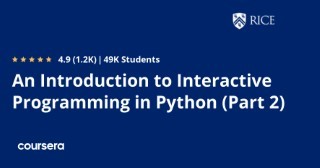An Introduction to Interactive Programming in Python (Part 2)
Learn the basics of building interactive applications with Python in this two-part course. Develop your programming skills and create games like Blackjack and Asteroids. Upon completion, you’ll be able to write interesting Python programs and progress to more complex projects. Start your journey now!
This two-part course is designed to help students with very little or no computing background learn the basics of building simple interactive applications. Our language of choice, Python, is an easy-to learn, high-level computer language that is used in many of the computational courses offered on Coursera. To make learning Python easy, we have developed a new browser-based programming environment that makes developing interactive applications in Python simple. These applications will involve windows whose contents are graphical and respond to buttons, the keyboard and the mouse.
In part 2 of this course, we will introduce more elements of programming (such as list, dictionaries, and loops) and then use these elements to create games such as Blackjack. Part 1 of this class will culminate in building a version of the classic arcade game “Asteroids”. Upon completing this course, you will be able to write small, but interesting Python programs. The next course in the specialization will begin to introduce a more principled approach to writing programs and solving computational problems that will allow you to write larger and more complex programs.
User Reviews
Be the first to review “An Introduction to Interactive Programming in Python (Part 2)”
You must be logged in to post a review.







There are no reviews yet.